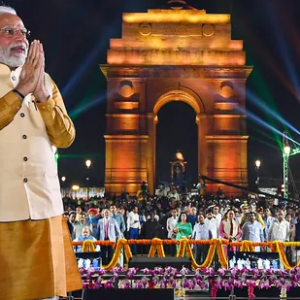In recent years, an entire industry has evolved that is devoted to addressing the ideological challenge of terrorism. Academics and journalists, think-tanks and public relations firms, security consultancies and intelligence agencies have all been engaged in the task of understanding and countering the belief systems supposedly underpinning the terrorist phenomenon.
In relation to the Arab world, the ailment is invariably diagnosed as the intolerant interpretations of the Islamic faith espoused by militant takfiris or other groups described as terrorist. And the cure – apart from purely punitive measures – is considered to be ‘de-radicalisation’, aimed either at dissuading young people, especially, from adopting such ideas and attitudes, or persuading those who have already been lured by them of the error of their ways. In addition to various educational initiatives, this effort has taken a variety of forms in various places: from requiring school teachers in the UK to report suspected ‘terrorist’ leanings among their pupils, to widespread internet and communications surveillance worldwide, to the establishment of special centres to rehabilitate repentant jihadis in countries like Saudi Arabia.
I will not comment on the effectiveness or otherwise of these de-radicalisation measures as they apply to individuals. But taking a broad view, I would argue that an excessive focus on the ideological aspect of terrorism and the challenges it poses is misguided – both as an analytical tool and as a basis for policy making.
Terrorism is not an ideology. It is a tactic. It is political violence employed in certain ways, depending on one’s precise definition. It is also a label: a political slur that delegitimizes the perpetrators and often, by extension, their cause. It may be a cliché to say that one person’s terrorist is another person’s freedom fighter, but it is no less true for that. It is also true that the label has always been applied selectively and inconsistently, in accordance with the power, politics and interests of both the labeller and the labelled.
To illustrate this from a personal perspective, as a Palestinian, all my life I have seen my people’s national struggle labelled as ‘terrorist’ by Israel and its Western backers. Initially, their analysts would depict this terrorism as a product of primitive nativism and Arab nationalist ideology. As the Cold War progressed, our terrorism became attributed to Soviet-inspired revolutionary Marxist ideology. In later decades, Islamic fundamentalism became the ideological force supposedly driving our incorrigible terrorist behaviour. I mention this to illustrate two points. First, the abuse of the ‘terrorist’ label to eclipse a political cause and reduce it to a kind of collective mental pathology. Secondly, how, over time, that political cause can change the ‘ideological’ colours in which it is expressed – in line perhaps with broader changing ideological ‘fashions’. The ‘ideology’ changes but the underlying cause remains, and continues for the same objective reasons to generate political violence.
None of this is to excuse or justify terrorist acts or their perpetrators, nor question the need for action to be taken to protect societies from them or for tolerant and pluralist values to be actively promoted in the communities that spawn them. But it is important to reiterate these basic truths, because they are increasingly being forgotten, or wilfully disregarded, in the Arab world today.
In the Arab world, the states most closely identified with the ‘war on terror’ are pursuing approaches to it that are to a great extent self-serving, short-sighted and ultimately counter-productive – if the aim is genuinely to combat the perpetrators of political violence and the ideologies that drive them.
For one thing, in the past few years, the number and range of organisations, individuals and governments they have designated as ‘terrorist’ has expanded so vastly that it has become meaningless. The clearest example of this is the ‘terrorist’ designation applied by Egypt, Saudi Arabia and others to the Muslim Brotherhood movement and various of its offshoots and other non-violent Islamist political groups and figures. The reason for this is nakedly political: part of a campaign by ruling regimes to reverse the region-wide Islamist political resurgence in the wake of the so-called Arab Spring uprisings of 2011 (selective thought this campaign may be: where expedient, such as in Yemen and Syria, Brotherhood-affiliated groups have remained in these countries’ good graces).
In Egypt, this ‘terrorist’ designation has been used to justify vicious repression, the killing of thousands and the jailing of tens of thousands of Brotherhood supporters and supposed sympathisers, accompanied by a wider draconian crackdown against all and any dissent or independent political action, liberals and leftists included. The Brotherhood is far from blameless, either in terms of its historical role or during its brief stint in power in Egypt. But the ferocious crackdown against it not only demonises its latter-day brand of moderate, civil-minded political Islam, but also signals to its followers that they have no prospect of promoting their convictions by democratic or peaceful means. The prisons have been filled with aggrieved activists, arbitrarily arrested and badly mistreated, while civil society as a whole has been suffocated mercilessly and public space subjected to a comprehensive shut-down. One could scarcely imagine conditions more guaranteed to fuel and encourage ‘terrorist ideology’ – all in the name of combating it.
The same can be said of the government’s approach to combating the groups already infected with the ‘terrorist’ bug, in Sinai and elsewhere. This has focused on the use of iron-fisted security measures and full-scale military force, with little regard for the marginalised local populations out of whose long-neglected socio-economic grievances these groups originally emerged, later attracting like-minded outsiders.
In Saudi Arabia and the Gulf states, the ‘terror’ label is also increasingly being used to silence and detain other critical or independent voices – including but by no means confined to Islamists – greatly restricting the public sphere for debate or airing social, economic or political grievances and demands. This too is a perfect recipe for driving dissent underground and destroying any faith in the possibility of effecting change by peaceful means – in other words, helping to nurture ‘terrorist ideology’. Yet the governments concerned loudly trumpet their anti-terrorist, modernising and reformist credentials.
Meanwhile, these countries conveniently disregard their own roles in spawning the region’s most egregious ‘terrorist’ groups, either by directly sponsoring them to achieve political goals such as in Syria, or indirectly by supporting the US invasion of Iraq (which led to the creation of the Islamic State) or the anti-Soviet jihad in Afghanistan (which gave birth to al-Qaeda).
Even Hamas, the Palestinian Islamist movement that controls the Gaza Strip, has made it onto the Saudi and allied ‘terrorist’ list, even though the kingdom was until recently on relatively good terms with the group. This designation seems related primarily to Saudi Arabia’s desire to befriend Israel, rather than Hamas’ Brotherhood affiliation as such. But it has nothing to do with actual ‘terrorist’ behaviour or ideology. Indeed, Hamas’ political platform has become strikingly moderate in the past few years, and its previous paramilitary actions were always confined to Israeli targets within historic Palestine. The ‘terrorist’ designation sends out the message that nothing is to be gained from this relative moderation and restraint, either for the group or for the besieged and embattled Palestinians of the Gaza Strip. Should we be surprised if this fuels the growth of hardline jihadi groups in the Strip? Whatever its portrayal in the West, nobody in the Arab world ever used to consider Hamas to
be ‘terrorist’.
The same can be said of Lebanon’s Hezbollah, whose actions have only ever been directed at Israeli occupation forces and military targets, yet finds itself designated as ‘terrorist’ by Saudi Arabia and its allies for reasons unrelated to any ‘terrorism’ but for entirely political considerations – to do with Israel, the conflicts in Syria and Yemen, the situation in Bahrain, and the over-arching regional rivalry with Iran.
Here too, we are seeing the language of anti-terrorism used in a manner that actually fuels the ideology of terrorism. Saudi Arabia and its allies are engaged in a fierce war of words with Iran. Whatever the rights and wrongs of the two sides’ disputes, this war is being waged in increasingly sectarian terms. Official pronouncements and media coverage routinely couch the struggle against Iran as one against Shi’ism and the Shi’a and their millennial beliefs, depicting them as an ideologically-driven existential threat and as the font of global terrorism. Given the dominance of Saudi and Gulf-controlled pan-Arab media, this has contributed greatly to the alarming growth in crude sectarian attitudes and discourse in the public sphere that we have seen throughout the Arab world in recent years. But it is playing with fire to stoke anti-Shia prejudices among Sunnis (or vice-versa) as a way of rallying support against a regional rival. Ultimately, it draws on the same well of bigoted takfiri intolerance which – in other contexts – everyone now claims to be combating.
This has extended to the horrific and futile war in Yemen, which was launched virtually on a whim three years ago to burnish the new Saudi leadership’s credentials. It thought it could prevail over the lightly-armed Houthis within weeks and restore its deposed allies to power in Sanaa. But the more the Saudi-led coalition gets bogged down in the conflict, the more it depicts it as a struggle against a menacing Iranian-sponsored Shia (and terrorist, of course) threat from its impoverished neighbour. In the real world, meanwhile, one of the intervention’s main outcomes has been to strengthen the position of al-Qaeda and similar groups in the south of the country– while creating what has been described as the worst humanitarian disaster on the planet. The aim of causing all this suffering, despair and resentment, we are told, is to combat terrorism. But what could be a better incubator of ‘terrorist ideology’?
That ideology can take many forms and need not be religious: the Kurdish PKK’s avowed secularism does not prevent it from being designated as terrorist by Turkey’s NATO allies (even while they sponsor its offshoots in Syria to suit their purposes!). Ultimately, ideology is a shell. The root cause of political violence lies in tangible political, social or economic grievances, mostly related to domestic misrule and/or foreign occupation and military intervention. It has thrived above all in the ‘failed states’ produced by the combination of these two factors, such as Libya, Iraq and Syria. Terrorist ideology can take on a life of its own, of course, and induce horrific behaviour, and serious efforts are required to counter both. But that will always be a secondary factor unless and until those underlying causes are tackled.
This may sound like a statement of the obvious, but it has to be made given current circumstances and attitudes in the Arab world. Using the ‘terrorist’ label to consolidate domestic power or pursue regional rivalries may be expedient. But in the ways they are waging their supposed wars on terror, Arab governments are recreating the conditions that generated the phenomenon in the first place.
Reducing terrorism to an ideology serves to belittle, discredit or deny the root causes, and to avoid tackling or drawing attention to them. It could be concluded, therefore, that a large part of the ideological challenge in combating terrorism lies in combating the ideology that deems ‘terrorism’ to be an ‘ideology’.
(This article is a summary of the address made by Mr. Abdel Bari Atwan, Editor-in-Chief of
Rai Al-Youm and Founder and Former Editor-in-Chief of Al-Quds Al-Arabi, Palestine at the Counter Terrorism Conference 2018 on 15th March, 2018 at Gurugram, Haryana.)
(This article is carried in the print edition of May-June 2018 issue of India Foundation Journal.)
Latest News

Bharat on the Move: A Decade of Change and Progress
April 16, 2024

Economic Reforms Since 2014
April 16, 2024

